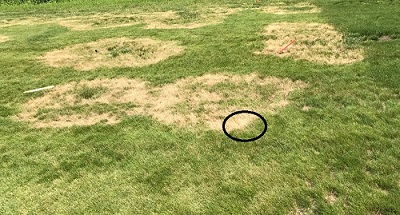Turf Disease Diagnostics
Download Form
Guidelines for Collecting & Packaging Turf Specimens:
Please submit samples based on the following guidelines for turf diseases, turf insects, turf nematode assay and turfgrass identification.
Fill out the ![]() Turf Diagnostic Form as completely as possible. The information supplied will enable a more thorough and accurate diagnosis. Include your address, phone number, and e-mail address so that we may contact you with questions and/or results. Photos of the problem are extremely helpful. Remember that accurate diagnosis requires both a representative sample and sufficient information about the cultural practices and environmental conditions associated with the disease problem.
Turf Diagnostic Form as completely as possible. The information supplied will enable a more thorough and accurate diagnosis. Include your address, phone number, and e-mail address so that we may contact you with questions and/or results. Photos of the problem are extremely helpful. Remember that accurate diagnosis requires both a representative sample and sufficient information about the cultural practices and environmental conditions associated with the disease problem.
Turf Disease Specimens:
1. Collecting a sample for turf disease diagnosis: Collect the sample when the grass is dry. A 4 to 6 inch diameter sample from the "leading edge" (see photo at the bottom of the page) of a problem is most useful. Include roots and soil to a depth of at least 2 inches and foliage showing a range of symptoms. Do not send smaller samples or samples collected with a soil probe. Sample from areas where the problem is active or increasing.
- Please take a sample before spraying any fungicides. It is difficult to make an accurate diagnosis after a fungicide has been applied.
- Please do not send dead grass. Dead plants have no diagnostic value. Samples should include both healthy and affected grass.
- Please do not send soil alone: we do not test soil for fungal or bacterial pathogens.
2. Packaging the sample: Do not add water or moist paper towels or seal tightly in plastic. Avoid soil and moisture on the grass. Wet or soiled grass will deteriorate and make diagnosis impossible. Wrap the sample in several layers of newspaper or a single layer of tin foil and pack it snugly in a sturdy box.
3. Photographs (optional): An accurate diagnosis cannot be made from photos alone, but pictures of symptoms on lawns or greens can be extremely helpful. Please e-mail photos to madeiras@umass.edu, or mail prints along with your sample.
4. Address packages for turf disease analysis to:
Turf Samples for Nematode Assay:
Announcement with Regard to the Comprehensive Nematode Evaluation Service:
The UMass Extension Nematology Lab will be closing its doors October 1, 2021. Dr. Robert Wick has retired after 36 years of dedicated service.
The UMass Extension Plant Diagnostic Lab will continue to handle nematology samples for vegetables, fruit, ornamentals, and pinewood nematodes; however, we will no longer be accepting samples for turfgrass nematology.
For more information, please see https://ag.umass.edu/services/plant-diagnostics-laboratory or call Dr. Angela Madeiras at 413-545-3209.
Alternative Turf Nematology Services:
Dr. Nathaniel Mitkowski, University of Rhode Island http://www.uriturf.org/
Dr. Rich Buckley, Rutgers https://njaes.rutgers.edu/plant-diagnostic-lab/
Dr. William Crow, University of Florida http://entnemdept.ufl.edu/people-directory/billy-crow/
Turf Insect Specimens: 
Grubs and other soft-bodied insects should be placed in 70% ethyl alcohol (rubbing alcohol is not ideal, but may work). Other insects must be carefully packaged. Do not place loose insects into envelopes for mailing, as the automatic process for handling mail will most likely destroy the specimens. Send the sample to the UMass Extension Plant Diagnostic Laboratory.
Turf Weed or Turfgrass ID Specimens:
Fill out the Weed and Invasive Plant Form as completely as possible. Collect the whole plant, including the roots if possible, and select the healthiest plants available. Wrap roots in a wet paper towel. Place plant in a zip-lock or freezer bag and seal with some air in the bag in order to prevent crushing. Place bag in a sturdy box or envelope for mailing. Send the sample to the UMass Extension Plant Diagnostic Laboratory
Diagnostic Fees (payment payable to University of Massachusetts):
- Turf Disease Analysis - $75
- Turf Insect ID - $50
- Turf Weed ID - $30
- Turfgrass ID - $30
Payment Options
By check: Enclose your payment with the sample. Make checks payable to the University of Massachusetts
By credit card: Enclose a copy of your credit card sales confirmation with the sample.
Return to the Plant Diagnostics Laboratory overview page
